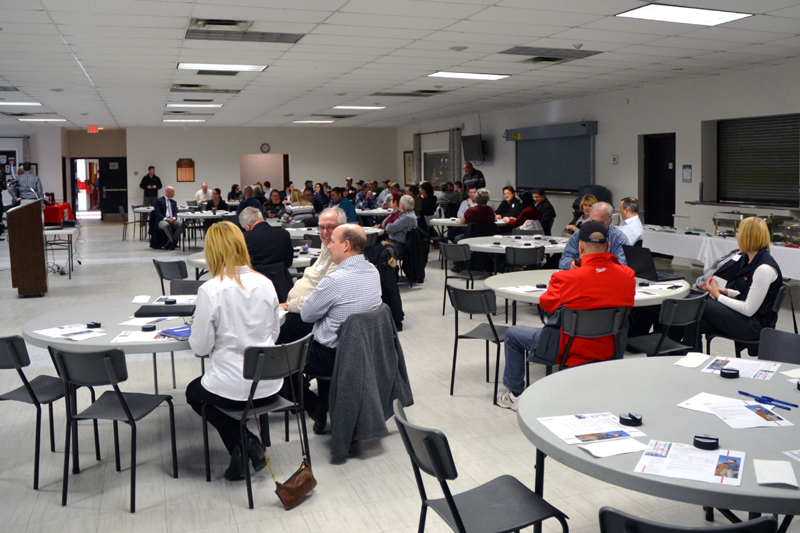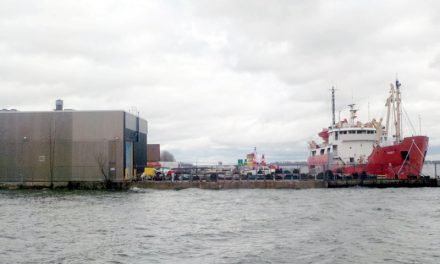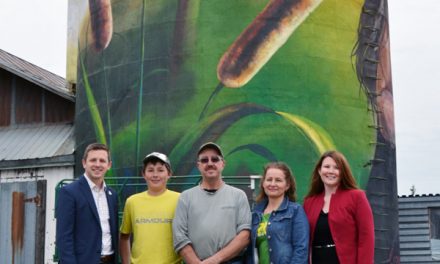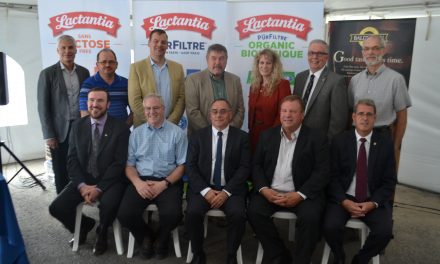Ready to learn
The BDO Agricultural Roadshow had a good turnout in Maxville on Dec. 6. The full day of presentations covered trade deals, the future of carbon and BDO advice for 2018. Sawyer Helmer photo
by Kalynn Sawyer Helmer
AgriNews Staff Writer
MAXVILLE – BDO held their annual Agricultural Roadshow over the last couple of months in 2017, travelling across Ontario to give producers an update on the most pressing agriculture issues at the moment. During their stop in Maxville, Agriculture and Agri-Food Canada (AAFC) Director Doug Forsyth got attendees up to date on the current trade issues on the table for the AAFC. He was followed by OFA Director Don McCabe who spoke out about the future of carbon in agriculture. BDO rounded things out with a Top 10 presentation of most important pieces of advice and an update on the proposed tax changes.

OFA Director Don McCabe spoke about the future of carbon tax and trading for Ontario agricultural producers and how they can use the market to benefit their operations, during the Maxville stop on the BDO Roadshow. Sawyer Helmer photo
Forsyth was encouraging about Canada’s trade agreements and said the AAFC “sees tremendous growth and tremendous opportunity,” in the six bulk markets: United States, European Union, Mexico, Japan, China and India. Of those six, Canada has free trade agreements with three and is looking into negotiations for free trade with the others.

Agriculture and Agri-Food Canada (AAFC) Director Doug Forsyth spoke to the BDO Roadshow guests about current and potential future international trade deals and their benefits for the agricultural sector. Sawyer Helmer photo
On the topic of NAFTA, Forsyth said, “The overall objective is to do no harm,” and that it is important that producers in all three countries support the agreement. “The aim is to modernize the agreement in a way that is beneficial to all three countries.”
He also spoke about Canada’s potential with the Chinese market. “Access to the market is attractive. Having said that, China is not an easy negotiating partner. It is a market that offers great opportunity but we need to be cognizant of who and what we are dealing with,” said Forsyth. China’s dictatorship means Canada must tread carefully and handle negotiations well.
Forsyth said the AAFC is also looking into alliances with South American countries to aid in a growing Canadian economy. He produced models projecting Canada to have $60-million in exports by 2025 and by further study showed that with effort it could be increased to $75-billion. This could be achieved, said Forsyth, through agriculture.
“There are a lot of challenges [when it comes to trade negotiations], especially with U.S. dynamics. A lot of it is out of our hands but we are doing our best to influence [those negotiations] and looking at other [potential] markets,” he said.
Forsyth concluded by noting Canada’s great potential in the future of global markets. “Global food demand will rise by 70 per cent by 2050 but Canada has a great potential. We have a reputation for healthy food, an abundance of natural resources and good transportation infrastructure.” Whatever the future of trade has in store, Forsyth seemed to believe Canadian agriculture would keep a good standing.
Forsyth was followed by McCabe who opened with a notion of the growing food demand. “I have no concern about our ability to feed the population in 2050,” he said. “Farmers have risen to every challenge.” This was followed by the startling statistic that 40 per cent of global food is wasted. When asked about the nature of that waste after his presentation, McCabe suggested that in developed countries, the majority of the waste occurs on the consumer end and in non-developed countries the majority occurs on the producer’s side.
That being said, what Canadian producers can do is incorporate sustainable practices and take care of their soil life to ensure the future of their crops. According to McCabe’s presentation, 3.1-million tons of residue can be removed in Ontario alone. In order to capitalize in the future, McCabe suggested agriculture needs to be able to participate in green markets and illustrate that they are the solution, not the problem. “Under cap and trade, agriculture gets to participate in the carbon market,” said McCabe. The Ontario system provides the opportunity for facilities with emissions of 10,000 tonnes and less than 25,000 tonnes to voluntarily participate and demands participation from facilities with 25,000 tonnes or more. Canadian producers also have an advantage because they already know how to “sequester, reduce and compliment, because we are always adapting,” said McCabe. However, despite cap and trade being here, McCabe also said, “it is not a complete system.”
What is important for producers to do in the interim of green policies, is take control of the dialogue around Canadian agriculture. “Information can be easily distorted so you better make sure you have your information right and available,” said McCabe. “It’s time to open your mouths. Canada needs to be able to illustrate that it is meeting its targets [environmentally] and get farmers engaged.”
McCabe concluded by rousing the attendees with the demand for producers to be able to communicate with the rest of the food system. “You own your future and you know your past. It’s time for your business to take on a communication role like never before and rebuild the bridge to the urban sector.”
BDO followed these presentations with some of their own information, presented by BDO Partner François Bourgeois, Team Manager (Agricultural Department) Jean-François Gratton and Senior Tax Manager Chantal Gagné. Of the top 10 most common questions that they receive, one message stood out the most; “Keep your history and record everything. Documentation will be the key issue for the future years,” said Gagné.
With the proposed tax changes, BDO had difficulty giving any finite advice since the new rules are still up in the air. What they did suggest rleated to the proposed rules against income sprinkling. The changes aim to apply a reasonableness test to determine if the children or spouse of a producer is contributing enough to the farm in order to deserve their salary. BDO told attendees they were continuing to fight to get a more defined outline of what is “reasonable” due to the unpredictability and differing opinions of the auditors. As one producer commented as he was leaving, “It’s going to be a hard thing to tell my wife I have to cut her salary.” As the experts said, documentation will be key for the future.













